The contraception boat has arrived, and now it's time for a party. "Ladies, have you heard the news?" the singer tells the villagers as his drummers strike up a pulsing beat.
"You can take a pill every day," he croons to the women sitting beneath a sprawling tree where goats and chickens roam past. "You can be with your husband and only have children when you want."

People sing and dance during a family-planning event in Ganvie.
Women leap to their feet and dance to the music. "Shame on the men who have lots of wives," the singer tells them as he prepares for a condom demonstration. "Woe to the women who have lots of children. Two is okay, three is already good."
Many of the women in this isolated village have never heard of modern contraception. But when the music is finished and the dancing is over, a few climb aboard the brightly painted boat, venturing inside for their first glimpse of a new future.
Villages such as this one, in rural Benin, are the fragile front line of a global battle over population growth and women's bodies – a battle that has now expanded to draw in Prime Minister Justin Trudeau and U.S. President Donald Trump on conflicting sides of the issue.

The contraception boat, nicknamed the Barque Mobile, uses a loudspeaker and a raucous sound system to attract attention.
The contraception boat and its crew, puttering cheerfully from village to village in a lagoon in southern Benin, is the latest innovation in an intensifying campaign by family-planning agencies to break the cycle of near-constant pregnancy that exhausts and oppresses millions of African women and stokes the rapid growth of population and migration worldwide.
But the contraception campaign has been dealt a blow by Mr. Trump. Just days after taking office, he ordered a halt to an estimated $600-million (U.S.) in annual support for family planning and health programs overseas. Any international program in which women are informed about the abortion option will have its U.S. funding removed, in a policy known as the "global gag rule."
This week, Mr. Trump went even further. His administration announced that it will eliminate all U.S. support to the United Nations Population Fund (UNFPA), accusing it of supporting a Chinese agency in "coercive abortion" policies, despite an earlier U.S. acknowledgment that there is no evidence of UNFPA funding for abortions in China. The eliminated U.S. funds will have a huge impact on reproductive health programs in the developing world, since the United States has been one of the biggest donors to the UN program.
The Trump cuts, an expanded version of earlier Republican policies, have triggered a global push back. Analysts say the Trump policy could lead to 6.5 million unintended pregnancies over the next four years. A new global fund to replace the lost U.S. money has raised about $200-million so far, including $20-million (Canadian) from Canada. Without it, women could be pushed "into the Dark Ages," according to Belgium's deputy prime minister, Alexander De Croo.
In addition to its contribution to the new fund, Canada launched a bigger response to the Trump cuts on March 8, International Women's Day, when Mr. Trudeau announced a $650-million three-year fund for reproductive and sexual health and rights in the developing world, including contraception and legal abortion programs.
African women are at the centre of these issues, but politicians have neglected them for decades. To understand the human pain and conflict at the heart of the population debates, The Globe and Mail travelled to the remote fishing villages of Benin. In these impoverished corners of the continent, the contraception campaign is more urgent than almost anywhere else in the world.
In a country like Benin, the impact of the campaign could be enormous. It finally offers hope to long-suffering women whose health has been badly damaged by decades of child-bearing.
But it could also help to slow the rapid rate of population growth that has helped create a global migration crisis, which in turn has fuelled the rise of nationalist politicians in Europe and the United States, along with controversial policies such as Mr. Trump's temporary halt to migrants from six Muslim-majority countries. The migration pressures from Africa's soaring population will also be felt in Canada, where immigration remains a divisive issue.
The fertility rate in Sub-Saharan Africa today is alarmingly high: about 5.1 children in a woman's lifetime, more than double the global average. And the population boom is concentrated in the world's poorest and most fragile countries, the ones least able to cope. The world's highest fertility rates today are in the impoverished West African nations of Niger (7.5 children per woman) and Mali (6.8 children).
Benin's fertility rate is not far behind those nations. "If you tell your husband that you don't want a large family, he will just go and marry another woman," says Christiane Djengue, the mother of eight children in the fishing village of Houedo-Gbadji in southern Benin.
"It's a lot of pressure. Our husbands love children and large families."
Her husband, Jacob, is happy with his big family, and even took a second wife. "You need a lot of babies because you never know how many are going to live and how many are going to die," he says. "What if we had only two babies and both died?"
But the cost to his wife is enormous. She has given birth 10 times over the past 19 years, and two of her children died. "I've had too many babies," she says. "I feel sicker and weaker. I suffer illnesses, like hypertension. I get headaches and vertigo and fatigue."
The African population boom, illustrated
Total fertility (medium projection) by country, 2015-2020
Percentage of people aged 60 or older by 2050
Graphics by Murat Yükselir/The Globe and Mail (Source: UN World Population Prospects, 2015 revision)
What's at stake in the population battle
If the family planning campaign can reduce Africa's stubbornly high birth rate, it will not only bring new freedoms to African women – it could also curb an explosive rate of population growth that threatens the future of the planet.
Population growth is helping to fuel many of the world's biggest crises, from climate change to migration and war. Many African countries can't produce enough jobs to keep pace with the birth rate, and people are left fighting over diminishing resources. The impact can be felt from the refugee camps of Nigeria and the malnourished children of Central Africa to the migrant boats of the Mediterranean and the human-trafficking routes of the Sahara and the Middle East.
Demography helps to explain why Africa is becoming increasingly crucial to the fate of the Earth. While the rest of the world has seen a sharp drop in its birth rate in recent decades, Africa's fertility rate has remained persistently high, to the surprise of experts who assumed Africa would follow the global pattern.
Africa's growth is now expected to be much more rapid than demographers had predicted. By the end of this century, the continent will be home to 4.4 billion people – a staggering fourfold increase from today, and double the number that the United Nations had been predicting a decade ago.
By the year 2100, according to UN studies, nearly half of the world's children will be African. The continent will account for more than 80 per cent of global population growth, pushing the world's population to a new peak of 11.2 billion. For better or worse, Africa will shape the world's destiny.
As the population boom gains momentum, humanity is increasingly becoming African. By the end of the century, about 40 per cent of the world's population will be African. Five of the world's 10 most populous countries will be African countries: Nigeria, Ethiopia, Congo, Niger and Tanzania. One nation alone, Nigeria, is projected to have 752 million people by 2100 and will be contributing more births to the world than any other country.
The consequences for the planet's health and environment will be immense. Africa's economies are unlikely to keep pace with this dramatic population increase. The result could be an escalating crisis in hunger, overcrowding, ecological damage, and rising migration pressures in Europe and North America and within Africa itself.
The Globe's investigation in Benin helps reveal how this extraordinary African population boom is driven by a disturbing pattern of inequality and discrimination against women. Shackled by illiteracy, poverty and cultural taboos, a quarter of married African women who want to avoid pregnancy still have no access to modern contraception. They remain subject to traditional and religious leaders who urge them to have large families, despite the risks to their health. Husbands and elders routinely pressure them into having more children than they can safely nurture.
Many African women have their first children in their teenage years and continue with scarcely a pause for much of their adulthood. Many women believe they need their husband's authorization before they can take contraception. Rumours and religious edicts have persuaded them that birth control is dangerous. And many African nations contribute to the crisis by criminalizing abortion and making contraception difficult to obtain, in rural regions especially.
"Our pastor told us that we can never use family planning," says Claudine Degbo, who belongs to a Methodist church in her home village of So-Ava in southern Benin.
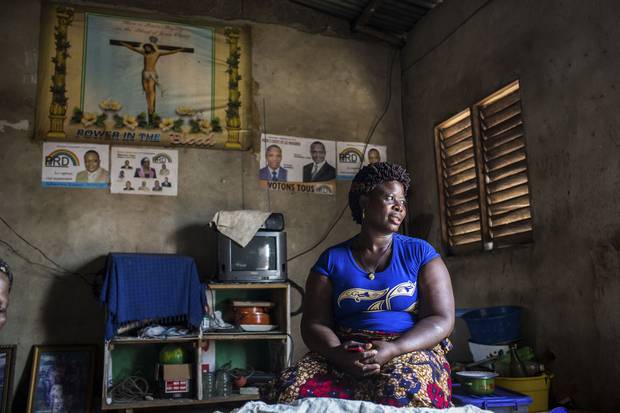
Claudine Degbo: ‘If I was to tell you about my suffering, it would take the whole day.’
After her first two children, she felt that her family was too poor to afford more. But she felt obliged to obey her husband and her church. She knew nothing about contraception, and it was impossible to talk to her husband about her desire to avoid pregnancy. So she had two more children, and both died. And then her husband took two more wives, so that he could have more children. "If I was to tell you about my suffering, it would take the whole day," Ms. Degbo says.
Yet throughout her ordeals, she has never questioned the pastor's edict that contraception is banned. "Our faith forbids it," she says. "When a teacher tells you something, you should obey."
To be sure, some African countries have made progress on family planning, especially in urban areas. Countries such as Zambia and Kenya have rapidly boosted the availability and use of contraception. But a recent study by a non-profit partnership, Family Planning 2020, identified 14 countries worldwide with the slowest growth in the use of contraception – and all 14 were in Africa.
Outside of Kenya and Southern Africa, less than 30 per cent of African women are using modern contraception. In many regions of West Africa and Central Africa, less than 10 per cent of women are using contraception. In Benin, for example, only about 7 per cent of married women are using contraception.
That's why the UNFPA and its local partners in Benin have begun using innovative ideas such as the "contraception boat" to provide information and supplies to remote villages where families of 10 or 12 children are still common.
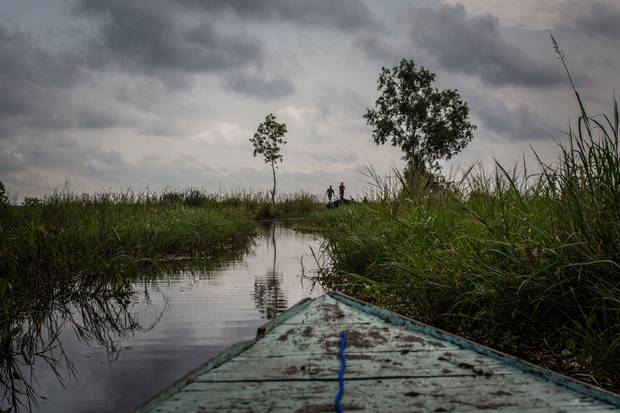
The contraception boat has to navigate into narrow rivers to access to comunities in So-Ava.
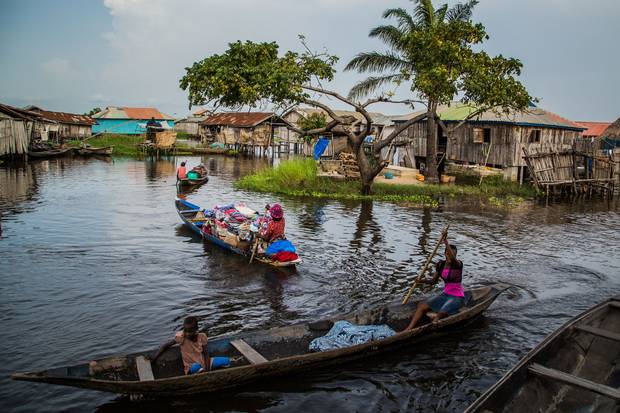
The villages of So-Ava are home to some 120,000 of the poorest people in Benin.

The contraception boat has to navigate into narrow rivers to access to comunities in So-Ava.
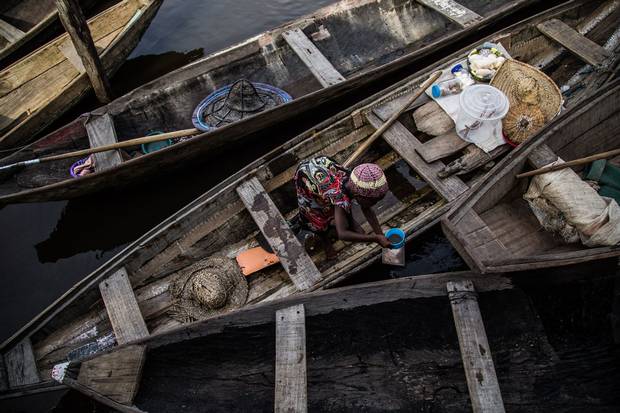
A young girl bails out a boat in downtown Ganvie.
The boat and the women
Every day, the boat cruises slowly through a lagoon of fishing villages known as So-Ava, home to some 120,000 of the poorest people in the country. Most live in rickety huts of wooden slats and metal roofs, suspended over the water on stilts. Small canoes are their only link to the outside world. The birth rate in rural Benin is 5.4 children per woman, but in So-Ava the average is seven children.
The flat-bottomed boat, nicknamed the Barque Mobile, uses a loudspeaker and a raucous sound system to attract attention. As it motors down the canals and rivers, it pumps out a steady beat of loud rhythmic music. Men sometimes dance on the stairs of their stilt houses as the boat passes.
At each village, when the Barque Mobile docks, a few curious women step cautiously aboard. Inside the boat, nurses work in two small clinics, giving counselling and contraception to the women. From tidy cabinets and desks, they hand out stocks of condoms and explain samples of birth-control pills, IUDs, implants and injections to those who are willing to give them a try.
At other stops on the boat's route, the campaigners organize boisterous meetings with music and speeches. "Who knows what contraception is?" a nurse asks a crowd of about 100 women (and a few men) in the stilt village of Ganvie.
"Me, me," a few women shout.
"If you have a lot of children, you'll have a shorter life, and you won't be able to take care of your children," one of the campaigners tells the crowd.
They hold up a poster with pictures of the various contraception methods. They explain the benefits of "spacing" a couple's children, with several years between births. They bring out a male musician to demonstrate the use of a condom on a carved wooden phallus, with much commotion and laughing from the audience, and they correct him on his errors.
"When your husband comes home and wants to get together with you, you tell him, 'Hey boy, that's not the way you do it, here's the way you do it,'" a nurse tells the women.
Then the campaigners answer questions about the contraception methods, dispelling some of the common myths. No, they tell the men, an IUD won't cause any injury to you during sex. No, they tell the women, taking the pill won't make it more difficult to have children later.
Among the crowd in Ganvie is a woman named Albertine Hoyeton. She is clutching her three-year-old son, her youngest child. Until she heard the loudspeaker from the approaching boat that day, she knew nothing about modern contraception. With her fisherman husband, she had five children in seven years – at great cost to her health.
"I was strong, but then I had several children," she says. "And now I'm weak and I'm often sick and I can't do many things. I don't sleep much, because I always have worries on my mind."
She often sees teenage mothers in her village. "I feel sorry for them, because their lives are miserable."
She wants her children's lives to be different. She wants them to use contraception, and she hopes that at least one of them will grow up to be a doctor.
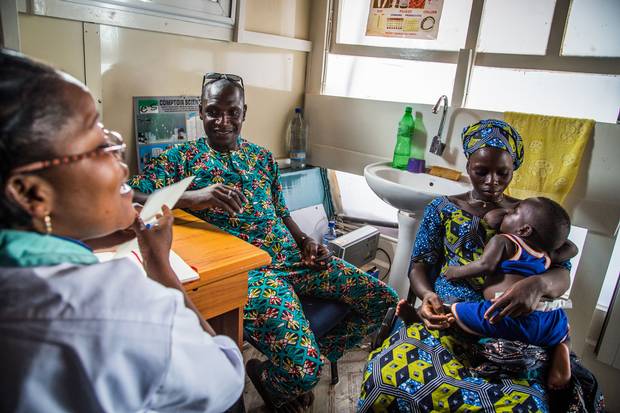
Simplicia Zannou and her husband Kokossou Bourasma consult a nurse about birth control on a mobile clinic boat in the So-Ava commune of Benin. Simplicia will find out later she is pregnant.
At another stop, Simplicia Zannou climbs aboard the boat with her husband and infant son. She is about 20 years old. (Like many people in Benin, she's not sure of her exact age.) She and her husband already have three children, and they want to learn about contraception. They listen quietly as the nurse explains the various methods. They decide that they prefer the pill. Then, as a routine check, the nurse asks if she can do a pregnancy test before prescribing the pills.
A few minutes later, the test strip reveals that Ms. Zannou is pregnant. She stares at the floor in shock, mopping her brow, while her husband laughs and plays with their baby.
"Another child," she murmurs to her husband. "We should have been finished with this. I told you before that we should have gone for family planning."
Her husband, a tailor named Bourasma Kokossou, has been dominating the conversation in the nurse's office, even when the questions are directed to his wife. "She'll just say exactly what I say," he explains. "My wife obeys me. Without my approval, she can't do anything. She can't even move."
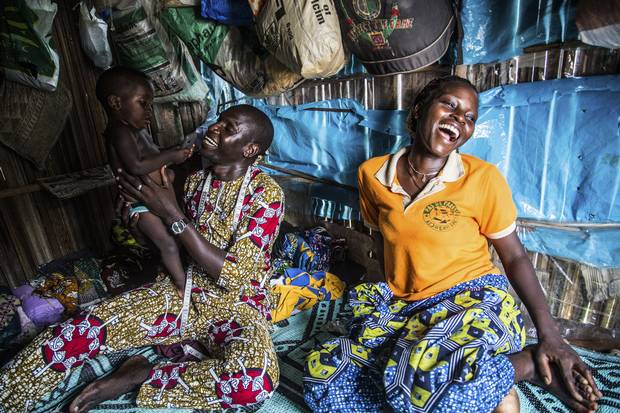
Simplicia Zannou and her husband, Bourasma Kokossou, play with their son Midokpe at home.
But later, in a back room of their village home, Ms. Zannou agrees to talk without her husband's presence. Their small two-room hut, filled with fabric and sewing machines, is built on stilts over the swampy water. Its floor is of rough wooden slats, and its walls are papered with tattered newspapers, old calendars and magazine pages.
Ms. Zannou is worried that her family cannot afford another child. She's afraid that her children's health could be affected by the burden of another newborn child. Her family is already sometimes forced to cut back to just one meal a day when the tailoring business is slow.
"How are we going to cope with this situation?" she asked her husband when they returned from the boat after the news of her pregnancy.
"Don't worry about the money, we'll get more customers," he told her.
And then they stopped talking about it. "In our community, the wife always does what the husband tells her to do," Ms. Zannou says. "The church tells us to obey our husbands."
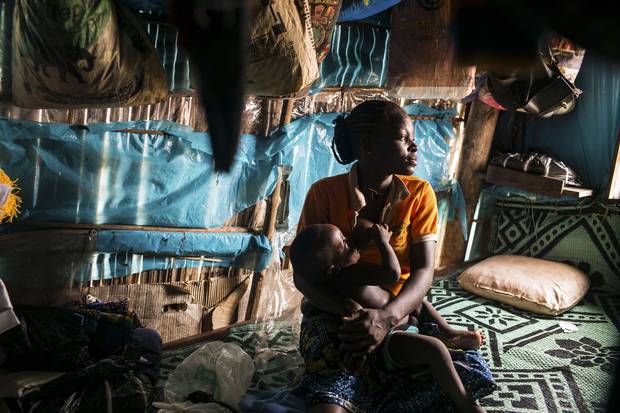
Simplicity Zannou and her husband already have three children.
While wives are taught to await their husband's authorization for family planning, husbands are allowed to have multiple wives. Only the first wife is legally registered, but their right to "marry" other women is widely condoned. In Benin, there are popular songs on local radio stations that jauntily tout the benefits of polygamy.
With these patriarchal attitudes firmly entrenched, Benin is one of the 14 African countries that have been the slowest to adopt modern contraception methods. Its government wants to persuade 20 per cent of women to begin using contraception by 2020, compared to the current rate of 12 per cent, but the goal is unlikely to be met.
Childbearing begins much too early in life for many African women. In some African countries, half of all girls are married before the age of 18. In Benin, girls are sometimes promised to men as future wives from the moment they are born, often to settle a family debt. The result is a huge number of teen pregnancies. Worldwide, about 18 million adolescent girls give birth every year in developing countries.
"You see grandmothers and their daughters with babies at the same time," says Koudaogo Ouedraogo, the UNFPA representative in Benin. "We can't continue with business as usual."
It's almost impossible to make significant improvement in education and economic development if the contraception rate is below 20 per cent, UN specialists say.
Even the spacing of children – allowing more than two years between births – can have a dramatic effect in reducing the death rate among children and mothers, while improving health and education levels. Bill and Melinda Gates, the billionaire philanthropists, argue that contraception is "one of the greatest life-saving and anti-poverty innovations in history."
In the impoverished villages of So-Ava, progress is so slow that a typical year would see only 60 or 70 women adopting contraception for the first time. But the campaigners found that they could triple this rate by using the boat to spread the message. Now they plan to add three more boats to the circuit.
"The boat has come here like a saviour," says André Todje, the deputy mayor of So-Ava. "Otherwise women would have no encouragement to reduce their family size. According to our tradition, women have no right to decide on children."
Mr. Todje sometimes goes to the village's churches on Sundays to spread the message about the risks of large families. But he admits that he's not allowed to mention contraception. "It's difficult," he sighs. "It's hard to get the message across in a church."
In photos: The mothers of Benin

Flavienne San, 20, and her 18-month-old daughter Ana. Benin is one of the 14 African countries that have been the slowest to adopt modern contraception methods.
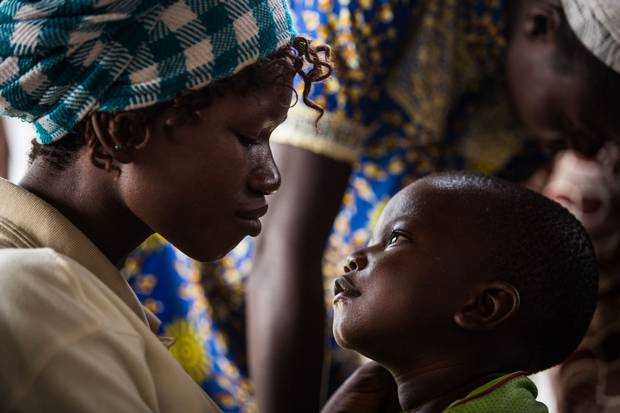
Children are an important marker of “family wealth” in Ganvie, explains Houhkpe Debora, 20. “If you don’t have any children, you are nothing here. So my son is my joy.”
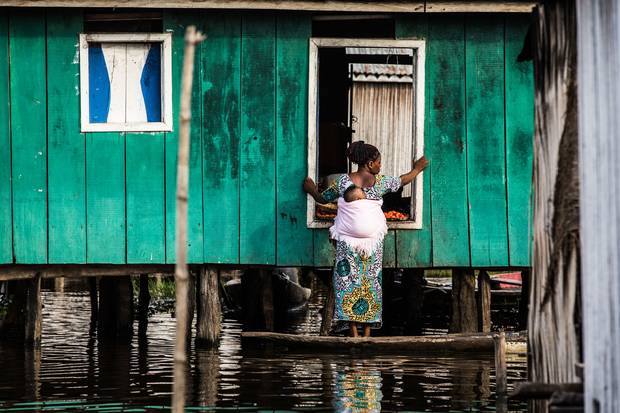
A woman stands on her boat outside of a house in So-Ava. For many in the community, small canoes are their only link to the outside world.
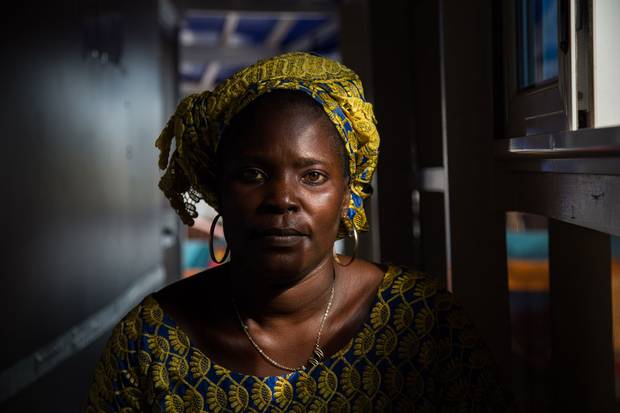
Celestine Soke, 40, has five living children, and lost five children. ‘I heard about the family planning before, but people were saying it was making women sick. It is when I saw the brand new boat and when they gave me a lot of information that I started being convinced.’
The obstacles
In a country where illiteracy is common, the contraception boat has sparked wild rumours and suspicions. Some villagers claim that it must be a brothel. When doctors deny it, they are accused of taking bribes.
Other villagers are convinced that the boat's family-planning ideas are a "Mami Wata" practice – a reference to a mermaid-like water spirit in traditional religions, which local churches often portray as evil. They are afraid that the spirit will cause their death if they enter the boat.
"We tell them that it's nothing to do with Mami Wata," says a nurse, Laetitia Gnansounou, who works for OSV Jordan, a local health group that runs the Barque Mobile with the UN's help. "There's a widespread idea that if they use contraception, they could die. In church, they're told that their mission from God is to multiply – to produce a lot of children."
To counteract the religious edicts, the family planning advocates tell the villagers that they should have only as many children as they can afford. But even in a desperately poor village, the villagers often reject this argument.
"They think children are their wealth," says Benin's health minister, Alassane Seidou. "It's a paradox. They think, 'If we don't have money, we should at least have children.'"
The problems in Benin are just a microcosm of a global crisis. The UN has estimated that 220 million married women worldwide are unable to get access to contraception, even though they want to avoid pregnancy. It's a shocking and worrisome number.
In some parts of the world, there has been strong progress in expanding access to contraception. One initiative, Family Planning 2020, estimates that 30 million women across the world have begun using contraception since the current campaign began in 2012. Yet this is still 19 million fewer women than the campaigners had hoped to reach by now, and they admit that their goal is unlikely to be achieved by the target date.
Even before the effect of the Trump cuts are fully felt, the UNFPA is lagging behind in its goal of raising $1.2-billion (U.S.) for contraception and other reproductive health supplies for the developing world over the next four years. Less than half of the target amount has been raised so far.
Until recently, Canada's contribution has been small. When the former Conservative government launched the high-profile $2.85-billion (Canadian) Muskoka Initiative for maternal and child health in the developing world in 2010, only about 1.2 per cent of the money was allocated to family planning, according to estimates by an advocacy group, Action Canada for Sexual Health and Rights. Federal spending on family planning after 2010 was actually lower than in previous years, it says.
The Conservative government, apparently for ideological reasons, halted Canada's contributions to the UN fund for contraceptive supplies after 2010, although some money was indirectly allocated for family planning through its support to UNFPA. (Canada gave about $70-million to UNFPA in 2015, but most was for programs supporting midwives and opposing child marriage.)
Babatunde Osotimehin, executive director of the UNFPA, told journalists last year that the Conservative maternal-health policy had treated women in the developing world "as bodies that deliver babies."
A recent federal review of the Muskoka Initiative has confirmed that family planning was "underrepresented" in the Canadian program. The shortage of family planning services is responsible for about 29 per cent of maternal deaths worldwide, the review said, citing published estimates.
The Conservatives also refused to include any mention of abortion in the health initiative. Abortion is illegal or heavily restricted in most of Africa, including Benin. This obliges women to have unwanted children, or forces them into the hands of unsafe abortion providers. The World Health Organization estimates that six million unsafe abortions are performed in Africa every year, resulting in 29,000 deaths and countless injuries.
Despite the Canadian refusal to include any discussion of abortion policy in the early years of the Muskoka Initiative, some African leaders are surprisingly willing to talk about decriminalizing abortion. "With time, our society will evolve towards it," says Mr. Seidou, the Benin health minister. "Unsafe illegal abortions are injuring many women. It's forbidden, but it happens anyway, so why not enable women to do it in safer conditions?"
Yet the irony is that the number of unsafe abortions is expected to increase sharply as a direct result of Mr. Trump's cuts to family planning programs.
In the past, whenever a Republican administration has cut the U.S. aid budget for family planning, studies have found a rise in the abortion rate. In one study, the abortion rate increased by 40 per cent in 20 African countries as a result of the U.S. policy. With less access to contraception, women often feel that abortion is their only choice – yet abortion is usually illegal, so they turn to dangerous clandestine providers, which results in thousands of injuries and deaths every year.
Under the $650-million three-year strategy that Mr. Trudeau has announced, the Canadian government will support a range of reproductive and sexual health rights in developing countries, including contraception and legal abortion. It will also provide funds to advocacy groups that challenge the anti-abortion laws in the estimated 125 countries where abortion is illegal or severely restricted.
Sandeep Prasad, executive director of Action Canada for Sexual Health and Rights, says the new strategy is a step in the right direction. But it amounts to less than $220-million annually, and he argues that Canada needs to spend much more on family planning in the developing world.
His group has proposed that Canada help to replace the U.S. cuts by spending a total of $450-million annually on contraception and other sexual and reproductive health programs in the developing world. This could prevent more than four million unintended pregnancies and a million unsafe abortions annually, it says.

Christiane Djengue sits on fishing nets and plays with her son while her husband rest in the bedroom. She has given birth to 10 children in 19 years, but suffered complications in most of them.
What the future holds
For many women in Africa, contraception is a late discovery, after a lifetime of children. Christiane Djengue, the woman who gave birth to 10 children in 19 years in a fishing village in southern Benin, suffered complications in most of her births. She remembers how she began thinking of getting an abortion after the seventh pregnancy, but a hospital nurse told her it was impossible. "This hospital will never do it," the nurse told her.
Only after her 10 th birth – when she almost died, trekking from hospital to hospital, bleeding, as she searched for a place that would give her a C-section operation – did she finally visit the Barque Mobile and get a birth-control injection. Nobody had told her about modern contraception before.
Today, her life is still difficult. "I can't relax, except when the children are sleeping, because one of my kids could fall into the water and drown," she says.
But she seems cheerful as she sits on a pile of fishing nets in her stilt house, breastfeeding her youngest baby, then playing with him and patting him affectionately. "It's because of this baby, my 10 th, that I finally went to family planning," she says, laughing.
There is hope, too, from a younger generation of urban women, who are increasingly aware of contraception. Larissa Koukoui, a 22-year-old university student in Benin's biggest city, Cotonou, says she wants to be married by 26 and then have three children at the most. On a recent day in Cotonou, she was visiting a clinic to ask about changing her contraception method.
Like most of her university friends, she has been using condoms, because of rumours that birth-control pills could make it difficult for her to have children later. But now she is thinking about switching to the pill, if the clinic doctor will dispel the false rumours.
"This is Africa, and most of our mothers don't use these methods," Ms. Koukoui says. "Our mothers tell us, 'We didn't use it, so you shouldn't.' But our generation is better informed."
Beyond her own personal needs, she is convinced that Benin must limit its population growth. She sees people living in terrible conditions in Cotonou, in flimsy houses among piles of garbage. "I see people suffering in poverty and living in dangerous areas, and I tell myself that nobody should be living in those conditions," she says.
"The more people there are, the less that nature can support us."
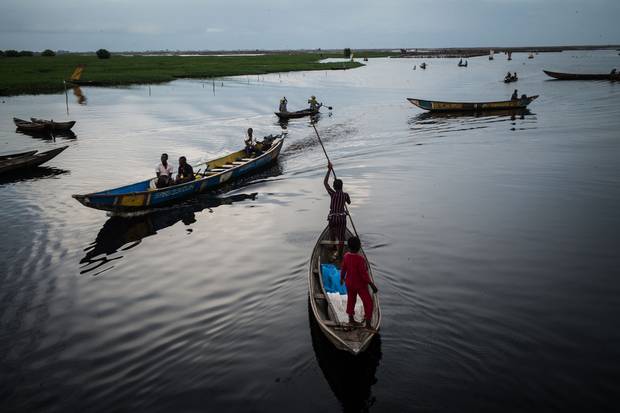
Sellers, passengers and fishermen navigate on the Ouémé River after leaving Ganvie wharf at the end of the day.
AN AGING AND GROWING WORLD: MORE FROM THE GLOBE AND MAIL




